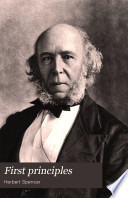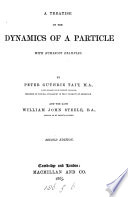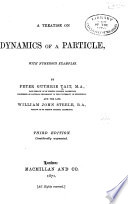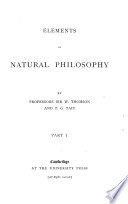 | Herbert Spencer - 1864 - 652 pages
...from a brief consideration of his simple statement of the laws of motion. The first of these laws is : Every body continues in its state of rest or of uniform...motion in a straight line, except in so far as it is compelled by impressed forces to change that state," Thus Professor Tait quotes, and fully approves,... | |
 | Peter Guthrie Tait - 1865 - 394 pages
...made use of at pleasure. These definitions being premised, we give Newton's Laws of Motion. 58. LAW I. Every body continues in its state of rest or of uniform...straight line, except in so far as it may be compelled by impressed forces to change that state. We may logically convert the assertion of the first law of motion... | |
 | Isaac Todhunter - 1867 - 372 pages
...discuss the First Law of Motion. 10. First Law of Motion. Every body continues in a state of rest or of uniform motion in a straight line, except in so far as it may be compelled to change that state by force acting on it. It is necessary to limit the meaning of the word motion... | |
 | Isaac Todhunter - 1867 - 368 pages
...difficulty. 133. We will here repeat the Laws of Motion. I. Every body continues in a state of rest or of uniform motion in a straight line, except in so far as it may be compelled to change that state by force acting on it. II. Change of motion is proportional to the acting force,... | |
 | William Thomson Baron Kelvin, Peter Guthrie Tait - 1867 - 914 pages
...viribiis cogitur statum suum muture. Ecery body continues in its state of rest or of uniform motion ma straight line, except in so far as it may be compelled by vmfinxsed forces to change that state. 245. The meaning of the term Rest, in physical science, Re*.... | |
 | Asiatic Society of Bengal - 1870 - 894 pages
...own state of rest or motion. This property which is called inertia is best defined by Newton's law " Every body continues in its state of rest, or of uniform...straight line, except in so far as it may be compelled by impressed forces to change that state." Now, by uniform motion we mean moving through equal spaces... | |
 | Peter Guthrie Tait, William John Steele - 1871 - 462 pages
...made use of at pleasure. These definitions being premised, we give Newton's Laws of Motion. 63. LAW I. Every body continues in its state of rest or of uniform...straight line, except in so far as it may be compelled by impressed forces to change that state. We may logically convert the assertion of the first law of motion... | |
 | William Thomson Baron Kelvin, Peter Guthrie Tait - 1872 - 316 pages
...movendi uniformiter in directum, nisi quatenus illud h viribus impressis cogitur stalum suum mutare. Every body continues in its state of rest or of uniform...straight line, except in so far as it may be compelled by impressed forces to change that state. 211. The meaning of the term Rest, in physical science, cannot... | |
 | Manthano (pseud.) - 1872 - 396 pages
...the means of verification are within our reach. But the Newtonian law, that " every body or substance continues in its state of rest, or of uniform motion,...straight line, except in so far as it may be compelled by impressed forces to change that state," cannot be accepted by human thought. "The continuance of a... | |
 | Manthano - 1872 - 408 pages
...our reach. But the Newtonian law, that " every body or substance continues in its state oT rest, or of uniform motion, in a straight line, except in so far as it may be compelled by impressed forces to change thai state," cannot be accepted by human thought. " The continuance of a... | |
| |